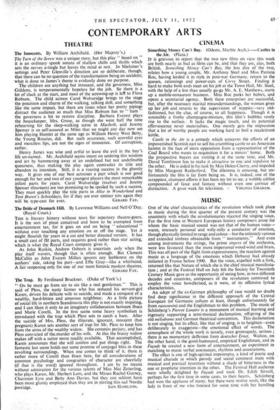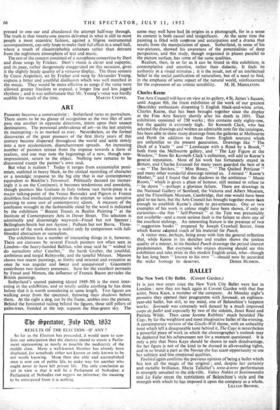MUSIC
ONE of the chief characteristics of the revolution which took place in music during the first quarter of the present century was the unanimity with which the revolutionaries rejected the 'singing voice.
For the first time in Western European history composers arose for whom the basic musical sound was not that of the human voice— warm, intensely personal and willy-nilly a conductor of emotion, though physically limited in range and colour—but the infinitely various and extended timbres obtainable from " instruments." And even among instruments the strings, the prime singers of the orchestra, were less favoured than the more impersonal wood-wind and brass. This was all part of the flight from expressiveness, the reaction against music as a language of the emotions which Debussy had already initiated in France before 1900. But the voice, expelled with a fork, returned like that Nature of which she is the chief musical manifesta- tion ; and at the Festival Hall on July 8th the Society for Twentieth Century Music gave us the opportunity of seeing how, in two different decades and countries, composers of the revolution contrived to employ the voice bowdlerised, as it were, of its offensive lyrical characteristics.
An adept of the ex-German philosophy of race would no doubt find deep significance in the different approach of the Central European (of Germanic culture at least, though unfortunately far from rassenrein) and the Englishman to this problem. The music of Schonberg's Pierrot Lunaire is a monument of musical learning and ingenuity supporting a semi-musical declamation, offspring of the old milodrame and German theatrical convention. This declamation is not singing, but its effect, like that of singing, is to heighten—even deliberately to exaggerate—the emotional effect of words. The atmosphere of the whole work is tensely, even grotesquely, serious ; there is no momentary deflexion from deutscher Ernst. Walton, on the other hand, is the good-humoured, empirical Englishman, and in Façade he created a new form of entertainment, an experiment in matching to music verbal assonances, rhythms and associations. The effect is one of high-spirited impromptu, a kind of poetic and musical charade in which parody and social comment mate with musical and poetical invention without a shade of bitterness in the one or prophetic intention in the other. The Festival Hall audience were wholly delighted by Facade and took Dr. Edith Sitwell, perhaps for the first time in some cases, to their hearts. Schonberg had won the applause of many, but there were restive souls, like the lady in front of me who listened for some time with her handbag pressed to one- ear and abandoned the attempt half-way through. The truth is that twenty-one poems delivered in what is still to most people a most eccentric fashion, against a filigree instrumental accompaniment, can only hope to make their full effect in a small hall, where a touch of claustrophobia enhances rather than detracts from the nightmare atmosphere of text and music.
The rest of the concert consisted of a saxophone concertino by Ibert and three songs by Fricker. lbert's music is clever and eupeptic, and its pace, rather dangerously exaggerated on this occasion, gives it the slightly heady quality of a virtuoso display. The three sonnets by Cecco Angiolieri, set by Fricker and sung by Alexander Young, express a bitter and youthful disillusion which was well matched in the music. They would be more effective as songs if the voice were allowed greater freedom to expand, a longer line and less jagged rhythms ; and it was unfortunate that Mr. Young's voice was hardly








































 Previous page
Previous page